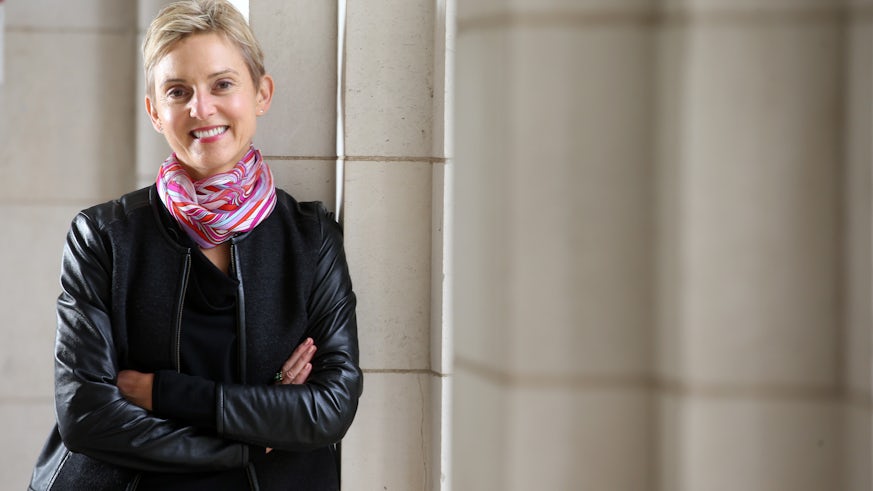Sêr Cymru Chair joins University of Texas
2 July 2020

World-leading Compound Semiconductor (CS) researcher and Sêr Cymru Chair, Professor Diana Huffaker, is joining the University of Texas after five years in Wales.
Professor Huffaker, a US citizen who completed her PhD in Material Sciences at University of Texas, is currently Scientific Director of Cardiff University’s Institute for Compound Semiconductors.
During her tenure in Wales, Professor Huffaker has helped to leverage £50m from UK Government to develop the Compound Semiconductor Applications Catapult, established a leading research group and assembled a cohort of international researchers in CS disciplines.
Professor Huffaker said: “I really appreciated the extraordinary opportunity the Sêr Cymru project provided to link basic science to economic impact, which has always been at the core of my activities. Sêr Cymru has truly allowed Cardiff to develop a core of excellent young and motivated scientists with international excellence, and their work will continue towards this vision. And, of course, I truly enjoyed meeting people and making friends in the city of Cardiff and across Welsh Government. What a special place.”
Professor Huffaker’s move to Wales from University of California, Los Angeles (UCLA) was funded through a Sêr Cymru Chair in Advanced Engineering and Materials, funded by Welsh Government – one of nine such publicly-funded chairs designed to attract world-leading scientists to Wales.
Kirsty Williams, the Education Minister, said: “I’d like to thank Professor Huffaker for her work as one of our prestigious Sêr Cymru Chairs and the legacy she leaves for future students in Wales. Professor Huffaker is a fine example of the world-leading academic talent from around the globe our Sêr Cymru programme successfully attracts. Wales has strong education links with the United States, particularly the southern states, and I wish Professor Huffaker the best in her next role in Texas.”
Professor Rudolf Allemann, Pro Vice-Chancellor, International and Student Recruitment and Head of the College of Physical Sciences and Engineering, added: “We are grateful for the crucial contribution Professor Huffaker has made to Cardiff during her five years as Sêr Cymru Chair in advanced materials and devices. Diana’s work to attract funders and recruit a cohort of internationally-acclaimed CS researchers to join us as we work towards building the world’s first Compound Semiconductor cluster – CSconnected - has been outstanding. We wish Diana well in her new role.”
During her time at the School of Physics and Astronomy, Professor Huffaker published several scientific papers on Compound Semiconductors – tiny high-speed electronic chips that are used in applications ranging from satellites and radar to tablets and mobile devices.
Professor Huffaker's research focuses on the development of unique materials that will enable the production of new devices with new functionality. She is best known for her pioneering work on the development of innovative CS 'quantum dot' materials, used in optoelectronics and laser physics.
Professor Peter Smowton, Managing Director of Cardiff University’s Institute for Compound Semiconductors said: “Professor Diana Huffaker has made major contributions to the development of the Institute for Compound Semiconductors and developed whole new and ongoing research strengths in Cardiff on, for example, complex compound semiconductor epitaxy and mid-infrared detector arrays. We wish to thank Diana for her excellent work, for leaving a lasting legacy and wish her every success in her exciting new position at the University of Texas.”
Professor Huffaker’s post was hosted jointly by the School of Physics and Astronomy and the School of Engineering.
Professor Sam Evans, Head of the School of Engineering, said: “Professor Huffaker has brought together an exceptional team of researchers, and has built a strong foundation for our continuing work in this exciting field.”
The Institute for Compound Semiconductors will move to a bespoke home for CS innovation in 2021-22. The Translational Research Facility will allow industry and academic researchers to work hand in hand with two world-leading institutes to explore tomorrow’s scientific processes and develop commercial products.
Share this story
It is a friendly, approachable School with a strong commitment to teaching excellence and world class research in physics and astronomy.





